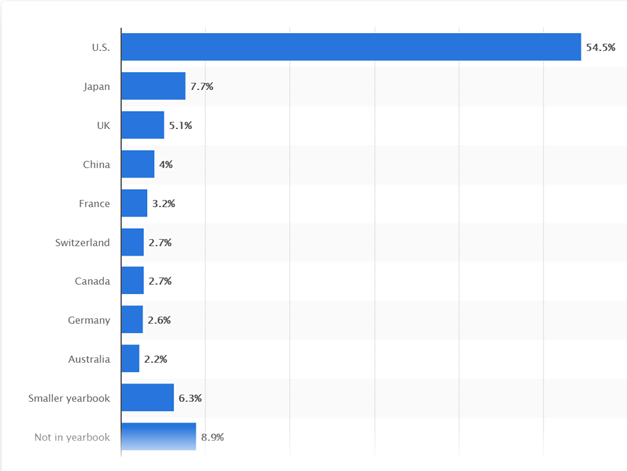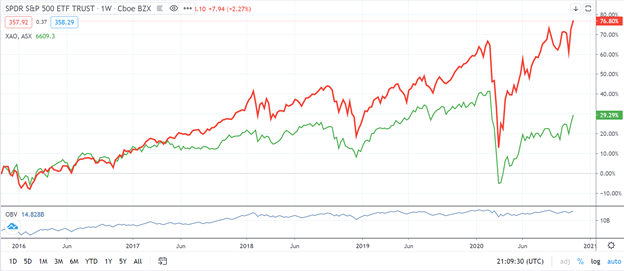According to the World Bank, the total market capitalisation of listed companies globally is said to be in the region of $80tn [1], with the U.S representing just over half of that entire amount. Based on these 2 simple facts, it’s not hard to see why other stock markets around the world tend to correlate highly with what’s going on in the U.S. Comparatively, Australia represents a little over 2% of the global market value of all stocks, it’s easy to see why our economy is more of the ripple than the one causing a splash.

Due to this major weighting of the U.S economy, when investors in Australia see what has happened overnight in the U.S market, it appears Australians follow suit. As the market roars or sinks in America, so too does it in Australia. You can see this strong correlation in the last 5 years in the chart below. The red showing the S&P500 and the green showing the All Ordinaries. Each representing the combined price movement of the largest 500 companies (by market capitalisation) from both the U.S and Australia, respectively.

The question then, is why do we appear to copy what happens in the U.S? The rational response is that the U.S is Australia’s 5th largest export partner, with a total of $36.8b of goods traded both ways in 2019. Market prices typically reflect both a change in reality and investor sentiment. So, if company’s aren’t going so well in the U.S, it may be natural to think that it could affect the economy in Australia. The key here is that there is a significant amount of investor psychology at play when it comes to trading in the markets. Markets are rife with anticipation and second guessing. Indeed, a Nobel prize was awarded in economics to Professor Thaler for establishing that people are predictably irrational — consistently behaving in ways that defy economic theory.
A brilliant summary along this line of thinking is explained by Warren Buffet below:
https://youtu.be/_sb6RKc_g_g
Emotions frequently dictate the buying and selling of stocks. However, there is hope in this sea of ups and downs. If you have done your research and due diligence on buying shares in a company, and the next day the price falls by 20% - this could be seen a discount opportunity rather than a time to sell. Granted your timing could have been better but timing the market can be a fool’s errand. Imagine that you just bought a new house, and the next day your neighbour offered you half the price you paid for it. How would you react to that? Would you panic and sell? Why should you react any differently when you own a stock?
How to think critically through volatility
What are you supposed to do in the world of volatility that we find ourselves in today? How can you leverage market psychology to your advantage? Ultimately, there is no single recipe, but asking yourself critical questions can help give you confidence when markets seem all over the place. Some critical questions can be:
1. Competition: Are there new competitors in the market that could impact the sales and financials of the company? If not, then think before rushing to sell just because of what’s happening elsewhere or what’s on the news.
2. Temporal Headwinds: Is the perceived impact temporary or is it a significant impact with long-term headwinds? For example, the banking sector and the once held monopoly over loans and digital wallets is being severely eroded by more nimble customer friendly start-ups. This is not a quick change and presents significant challenges to banks’ profitability over the long-term.
3. Are there any geo-political impacts that could impact the performance of the company, like the possibility of a trade embargo e.g. Australian wines being sold to China may be stopped, significantly impacting companies involved in that industry value chain.
4. Financial strength: Perhaps most importantly, does the company have a solid balance sheet with significant cash reserves to weather a storm? Things to look out for here are equity to debt ratios, cash on balance, short and long-term debt, current level of net profit after tax and trends over the last 5 years for each of these metrics.
Though we can’t predict what the future holds, and there are inherent risks when it comes to making investments, we can arm ourselves with a solid understanding of what the company does and how a sector may be changing. Attention to detail when it comes to the company’s financials is absolutely paramount, we should look to the facts and while acknowledging the importance of prices in the market, it should not dictate how we buy and sell stocks in the short-term. We need to think and invest critically.
.png)
.png)